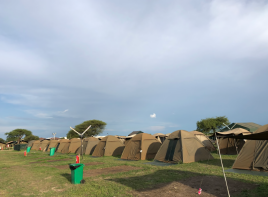01 August 2022
TILENGA AND EAST AFRICAN CRUDE OIL PIPELINE (EACOP) PROJECT


OVERVIEW
Alistair Group, in partnership with Geomechanics, were contracted by TOTAL in 2018/2019 to conduct the geotechnical survey for the East African Crude Oil Pipeline (EACOP) project. The scope included investigations along the Tanzanian portion of the pipeline from Mutukula up to Tanga Port. The geotechnical survey findings were incorporated into the design and construction of the 1 443km pipeline. The fieldwork in Tanzania commenced in October 2018 and ended in May 2019. The investigation sites in Tanzania were spread across the entire pipeline route.
ALISTAIR GROUP’S RESPONSIBILITY:
Alistair Group provided logistics support and fleet management services for the geotechnical survey. We provided vehicles, qualified personnel, community engagement services, refrigerated transport, lifting equipment, and management of over 100 vehicle movements across the pipeline route.
Below is a breakdown of the customised technology-driven services Alistair Group provided for this project:
- Track and Trace, utilising GPS units on each vehicle, driver phone GPRS tracking strict radio communications and controls
- Digital Journey Management of our own and subcontractors’ fleet
- Fuel Management
- Workshop (Preventative Maintenance)
- Driver Management
- QHSE Management
- Training and On-Boarding
- Implementation of Pre-use Checklists
- Local Content Tracking
- Digital Registers for Community Liaison/Resettlement



THE CHALLENGE AND ACCOMPLISHMENTS:
This project did not come without a set of unique challenges that Alistair Group had to resolve with innovative and forward-thinking solutions. We pride ourselves on our ability to utilise technology in a “technologically-dark” geography to make our customers work better and provide extensive visibility into their operations.
Below is a breakdown of the top challenges Alistair Group faced whilst executing this project and an overview of the solutions we implemented to overcome them:
1. QHSE
The safety standards for this project were very stringent and determined by TOTAL’s international regulations. The project was held in a remote location and included other entities that were not accustomed to the Oil & Gas operations requirements.
Our solution:
- We implemented a paperless QHSE, route and driver management system
- Alistair Group developed and implemented a zero accident policy and documentation that was followed during all operations. This policy outlines guidelines to prevent risk and accidents.
- We conducted random breathalyzer testing on all personnel
- Daily Driver Briefings were held including Daily Safety meetings
- Safety and First Aid training was conducted to prepare personnel for potential accidents that could occur due to the rough terrain they were conquering, the isolated environment we were operating in and any natural and man-made hazards that potentially could occur.
- In all of its projects, Alistair Group and Geomechanics take responsibility for the environment very seriously. In this case, all drill muds and used water were safely collected and removed from the site and all sites were fully rehabilitated after completion.
Achievements
- There were zero safety incidents reported during 120, 000 man-hours.
- Waste reduction as minimal physical documents were produced.


2. FLEET MANAGEMENT
The operations required a large fleet to perform several trips to different locations per day in a remote location (averaging 15 trips a day per vehicle). This scope introduces a variety of logistical challenges in regards to fleet planning, maximising a driver’s time, fuel management, visibility, tracking of passengers and personnel location and more.
Due to the size of the fleet needed Alistair Group utilised our own fleet as well as subcontractors’ fleet to execute the scope. This introduced a series of its own challenges as 24/7 status awareness of the trip was essential.
Our solution:
- We developed an in-house system specifically tailored to the client’s needs with the following main features:
- Active Journey Management building on GPS but also introducing radio controls
- Paperless digital Checklist
- Mobile APP (accessible to drivers, workshop team, fuel team and management) to send/receive their daily tasks, check-lists and critical communications
- A web-based platform where the client can access all real-time trip updates.
- We conducted daily in-person driver briefings and safety meetings to review the objectives of the day and to rehash the safety requirements when transporting cargo or personnel.
Benefits of our Solution
- Our digital solution was highly acclaimed by all stockholders as it allowed for
- Avoidance of using physical documentation (waste reduction, eliminating a convoluted filling system)
- Real-time Trip Updates including off-route, speeding and harsh braking alerts
- Controlled operating environment




